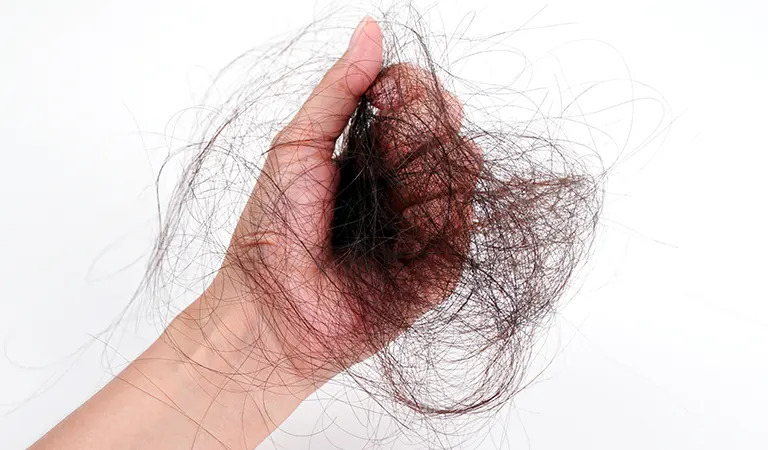

Diffuse Alopecia Causes & Treatment: Frequently Asked Questions (FAQ)
Everyone loses hair at some point in their lives. It's very common to find signs of it during your morning shower, while you're blow-drying your hair, or when you give it a quick comb. It's no secret that hair loss is a common problem that affects both men and women, according to a study published in the Journal of Clinical and Diagnostic Research (JCDR), 60 percent of people globally suffer from alopecia.
Let us ease your worries by answering some of the most frequently asked questions about this condition
What is diffuse alopecia?
The medical term for hair loss is alopecia. If alopecia affects the entire scalp, it is referred to as diffuse alopecia. Although this condition might make the hair appear thinner (nearly bald in some areas), it is only temporary. Diffuse thinning usually lasts six months or less and it can be treated with different treatments.
Also Read: Symptoms of Alopecia Areata
What are the causes of diffuse alopecia?
Diffuse thinning can be caused or exacerbated by a variety of factors. One of the most common causes of diffuse hair loss is called telogen effluvium. When a considerable number of your hair enter the telogen or resting, phase of the hair growth cycle, premature hair loss occurs.
Although telogen effluvium is a common cause of diffuse thinning, it is not the only cause. Other factors that may contribute to diffuse thinning include:
- Male pattern baldness.
- Female pattern baldness
- Anagen effluvium.
- Diffuse alopecia areata
- Stress
- Medical conditions

What are the signs of diffuse alopecia?
You may notice the following signs and symptoms, when you experience diffuse hair loss:
- Reduced hair density: Visibly thin hair is the most evident indicator of diffuse hair loss. Your hair may appear less dense than usual, with less hair around the hairline and crown.
- Visible scalp: Your scalp may become more visible when your hair density diminishes. When your hair is moist or you gaze at your scalp under bright, downward-facing light, this symptom is more obvious.
- Excessive hair loss: A huge amount of hair strands on your pillowcase, on your bedsheets, or around your shower drain is a common sign of excessive hair loss.
Evaluate the current state of your hair condition. Take the Hair Loss Evaluation Test Now!
What's the difference between diffuse unpatterned and diffuse patterned alopecia?
Diffuse unpatterned alopecia, or DUPA, is characterized by intermittent hair loss. In this condition, Men's hair loss is not limited to the front and crown, as it is in diffuse patterned alopecia, but also affects the back and sides of the scalp. Diffuse patterned alopecia, on the other hand, only affects the top of the scalp. Hair loss will begin in the front above the brow and progress to the crown of the head, but it will stop there.
Also Read: Female Patterned Baldness
How do you prevent diffuse alopecia from getting worse?
Comb your hair with a wide-toothed comb and a gentle brush. Hairbands and other unnecessary hair products, such as hair gels, should be avoided. Hair growth is influenced by nutrition, so make sure you eat a balanced diet full of vitamins, proteins, and minerals. Attempt to reduce stress and, if necessary, seek support. All of this will assist in preventing diffuse alopecia from becoming much worse.
What is the best treatment to cure diffuse alopecia?
Conventional treatments
The most common conventional treatments are topical medicines like immunosuppressants in the form of oral pills that are utilized to encourage hair growth. The drugs work on immune cells to release the hair follicles from the grip of the immune system. Conventional treatments come with the risk of serious side effects that can impair the function of your body's most vital organs.
Homeopathy Treatment
In contrast to conventional topical treatments, homeopathy treatment for diffuse alopecia is safe and has no side effects. The homeopathic treatment enhances the overall quality of life and effectively manages stress.
Homeopathy is one of the most effective treatments for hair loss. Hair regrowth is significantly aided by homeopathic treatments, and bald spots are effectively reduced. According to a study conducted by the National Center for Biotechnology Information (NCBI), natural ingredients like Thuja Occidentalis and Sabal Serrulata are especially effective in treating diffuse alopecia.
Instead of suppressing symptoms to provide temporary comfort, homeopathic treatment focuses on the underlying cause of alopecia. People of all ages and stages of life, including pregnant and lactating mothers, can benefit from homeopathic treatments.
Why Choose Dr Batra’s®
Dr Batra's® achieves the best outcomes by integrating cutting-edge technology with the science of homeopathy. Our homeopathic doctors have treated over 600,000 hair patients, and they are well-versed in diffuse alopecia. Our homeopathic trichologist consults provide you with personalized treatment. To provide comprehensive care, this treatment combines homeopathic remedies with dietary and lifestyle recommendations.
Our skilled homeopathic doctors understand the emotional anguish that diffuse alopecia patients go through. We provide treatment as well as advice on how to cope with and manage this hair issue.
Key Takeaways
- Hair loss is a common issue that affects both men and women worldwide.
- Many people notice hair loss during daily activities like showering or combing.
- A study shows that 60% of people around the world experience alopecia.
- Understanding hair loss can help ease concerns and worries about the condition.
- This blog answers common questions about hair loss to help inform readers.

